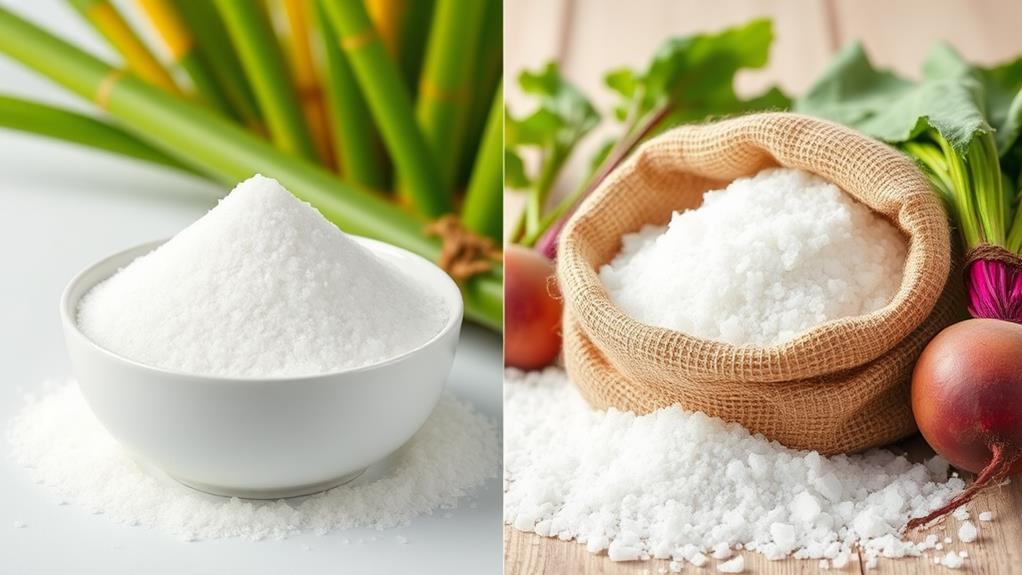Not all sugars are created equal, so let's break it down! Refined sugar, like white sugar, is processed and lacks nutrients, offering just empty calories. This can spike your blood sugar and lead to cravings or fatigue. In contrast, unrefined sugar, such as raw sugar, honey, or maple syrup, is minimally processed, preserving vitamins and minerals that benefit your health. These natural options are tastier and often have a lower glycemic index, which helps stabilize your energy levels. By understanding these differences, you can make smarter choices for your diet, and there's so much more to explore on this topic!
Definition of Refined Sugar
When you think about refined sugar, you're considering a sweetener that's been processed to remove impurities and molasses, resulting in a pure, white crystalline substance. This form of sugar is often what you find in your kitchen, whether it's in your sugar bowl or those baked goods you love so much.
It's derived mainly from sugarcane or sugar beets and undergoes a series of steps that include extraction, purification, and crystallization.
You might be curious about why refined sugar is so popular. Its fine texture and neutral flavor make it incredibly versatile. You can sprinkle it on cereal, mix it into coffee, or use it in recipes without changing the overall taste of your dish.
Plus, it dissolves easily, making it a favorite for beverages and desserts alike.
However, while refined sugar can elevate flavors, it's important to remember that it lacks the nutrients found in unrefined alternatives.
Definition of Unrefined Sugar
Unrefined sugar is a type of sugar that hasn't gone through the extensive processing that refined sugars do, meaning it retains more of its natural nutrients.
You might be surprised to learn about the nutritional benefits it offers and the common types available in stores.
Let's explore what makes unrefined sugar a popular choice for many people looking for a more natural sweetener.
What Is Unrefined Sugar?
Sugar in its unrefined form is minimally processed and retains more of its natural nutrients compared to refined sugar. This means you're not just getting sweetness; you're also enjoying the essence of the sugar cane or beet. Unrefined sugar includes options like raw sugar, jaggery, and coconut sugar, each offering unique flavors and textures. Imagine a rich, caramel-like taste that adds depth to your favorite recipes!
When you choose unrefined sugar, you're opting for a product that's closer to its natural state. The processing methods for these sugars are gentle, allowing them to keep some of the minerals and vitamins that refined sugars lose.
So, while you're sweetening your coffee or baking a cake, you're also making a more innovative choice that aligns with a whole-food lifestyle.
This type of sugar can be a fun addition to your pantry. It encourages culinary creativity, inviting you to experiment with flavors.
Whether you're drizzling it over yogurt or using it in your morning smoothie, unrefined sugar provides a delicious alternative that speaks to both taste and nutrition. It's a small shift that can lead to big changes in how you enjoy sweetness!
Nutritional Benefits Explained
Choosing unrefined sugar not only enhances the flavor of your dishes but also offers nutritional benefits that refined sugars lack. Unlike refined sugars, which strip away essential nutrients, unrefined sugars retain natural vitamins and minerals. This makes them a better choice for your overall health.
To illustrate the differences, here's a quick comparison:
| Nutrient | Unrefined Sugar | Refined Sugar |
|---|---|---|
| Calcium | Present | Absent |
| Iron | Present | Absent |
| Magnesium | Present | Absent |
| Antioxidants | Present | Absent |
These nutrients play important roles in your body, from supporting bone health to boosting your immune system. Plus, unrefined sugar often has a lower glycemic index, meaning it can provide a steadier energy release. So, when you're baking or sweetening your favorite foods, consider using unrefined sugar. Not only will your dishes taste better, but you'll also be nourishing your body with every bite. It's a delicious way to take a step toward healthier eating!
Common Types Available
When you explore the world of sweeteners, you'll find that unrefined sugar comes in several common types, each offering unique flavors and benefits.
One popular type is coconut sugar, which has a rich caramel taste and retains some nutrients from the coconut palm. It's a fantastic choice for those looking to add a deeper sweetness to their recipes.
Next up is raw cane sugar, often seen as a golden treasure in the kitchen. It's less processed than white sugar, allowing it to keep some of its natural molasses, giving it a light brown color and a hint of flavor.
Another exciting option is jaggery, made from the sap of sugarcane or palm. It's often used in traditional dishes and boasts a robust taste, along with a variety of minerals.
Lastly, there's maple sugar, derived from the sap of maple trees. Its unique flavor profile can elevate everything from baked goods to savory dishes.
Each of these unrefined sugars not only sweetens your food but also brings a touch of innovation to your culinary adventures!
Nutritional Comparison
Refined and unrefined sugars differ greatly in their nutritional profiles. When you look at refined sugars, like white sugar and corn syrup, they're stripped of most vitamins, minerals, and fiber. This means they provide empty calories—calories that don't offer any health benefits. You might find that they can spike your blood sugar, leaving you feeling tired and craving more.
On the flip side, unrefined sugars, such as raw honey or coconut sugar, retain some of their natural nutrients. They contain trace amounts of vitamins and minerals, like potassium and magnesium, which can be more beneficial for your body.
Plus, these sugars often have a lower glycemic index, meaning they can help maintain steadier energy levels.
Isn't it interesting how something as simple as sugar can have such different nutritional values? By choosing unrefined options, you're not just sweetening your food; you're also adding a bit of nutrition.
Health Impacts of Refined Sugar
Excessive consumption of refined sugar can lead to a multitude of health issues. You might think a little sugar is harmless, but over time, it can wreak havoc on your body. Understanding the risks can help you make smarter choices.
Here are some health impacts of refined sugar to keep in mind:
- Weight Gain: High sugar intake can lead to increased calorie consumption, contributing to unwanted pounds.
- Diabetes Risk: Consuming too much refined sugar can cause insulin resistance, increasing your chances of developing type 2 diabetes.
- Heart Disease: Diets high in sugar can raise blood pressure and lead to inflammation, both of which are linked to heart disease.
- Dental Problems: Sugar feeds harmful bacteria in your mouth, increasing the risk of cavities and gum disease.
Benefits of Unrefined Sugar
Unrefined sugar offers several benefits that can enhance your overall health while satisfying your sweet tooth. Unlike refined sugar, unrefined sugar retains more nutrients, which means you're getting a bit of a health boost with every sweet bite.
It's packed with minerals like calcium, iron, and potassium, which can support your body's functions. Plus, it often has a lower glycemic index, helping to stabilize your blood sugar levels.
Using unrefined sugar can also lead to a richer flavor in your dishes. You'll find that it adds depth and complexity, making your favorite recipes even more enjoyable.
Imagine biting into a cookie that's not just sweet but bursting with a warm, caramel-like richness.
Moreover, incorporating unrefined sugar into your diet can encourage healthier eating habits. By choosing it over refined options, you're making a step towards more natural ingredients.
It's a small but impactful change!
Making Informed Choices
When it comes to choosing sugars, understanding their differences can help you make better decisions for your health. Traversing the world of sugar can feel overwhelming, but you can simplify it.
By focusing on a few key aspects, you'll be empowered to select better options that align with your lifestyle.
Here are some innovative tips to guide your choices:
- Read Labels: Check the ingredient list. Look for natural sources like cane sugar or honey rather than artificial sweeteners.
- Prioritize Quality: Opt for unrefined sugars, which retain more nutrients and flavor compared to refined versions.
- Moderation is Key: Enjoy sweets, but keep your portions in check to maintain a balanced diet.
- Explore Alternatives: Consider using natural sweeteners like maple syrup or dates that offer additional health benefits.
FAQ
What Are Common Sources of Refined Sugar in Everyday Foods?
You'll find refined sugar in many everyday foods like sodas, candies, baked goods, and breakfast cereals. It's often added to sauces and dressings, making it easy to consume more than you realize.
Can Unrefined Sugar Be Used in Baking Recipes?
Yes, you can absolutely use unrefined sugar in baking recipes! It adds unique flavors and nutrients to your creations, enhancing your culinary innovation. Just remember, it might slightly alter texture and sweetness levels in your baked goods.
How Do Refined and Unrefined Sugars Affect Blood Sugar Levels?
Refined sugars spike your blood sugar quickly, causing energy crashes. Unrefined sugars, on the other hand, release energy more gradually, helping maintain steadier levels. Choosing wisely can support your overall energy and health.
Are There Any Artificial Sugars Similar to Refined Sugar?
You might think artificial sugars mimic refined sugar, but they don't always behave the same way in your body. Explore options like stevia or erythritol; they offer sweetness without the same blood sugar spikes.
What Is the Environmental Impact of Producing Refined Versus Unrefined Sugar?
When considering sugar production, you've got to weigh the environmental impacts. Producing refined sugar often involves more resource-intensive processes and pollution, while unrefined sugar typically requires less energy and may support sustainable practices.
Final Thoughts
In the world of sugar, think of refined sugar as a shiny, fast car zooming down a highway, while unrefined sugar is a sturdy, dependable bicycle, perfect for a scenic ride. Both have their place, but the bicycle helps you enjoy the journey and keeps you healthier in the long run. So, when you choose your sweeteners, remember that unrefined sugar offers more benefits for your body, allowing you to savor the ride of life with a little extra sweetness!



